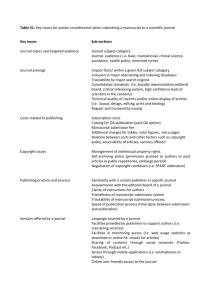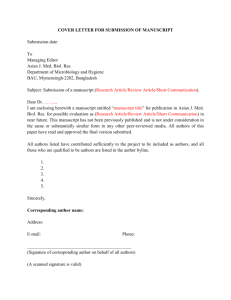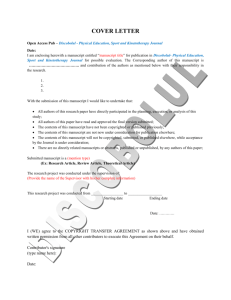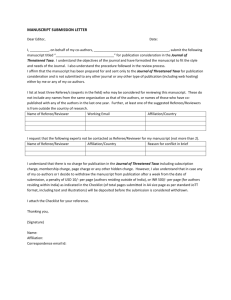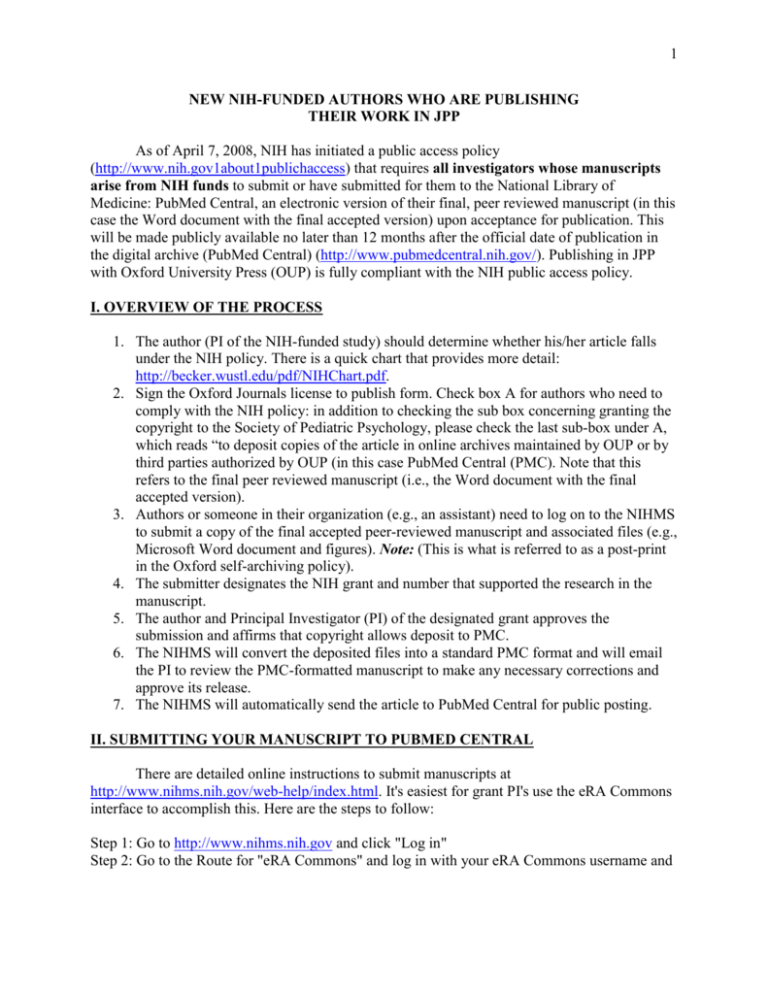
1
NEW NIH-FUNDED AUTHORS WHO ARE PUBLISHING
THEIR WORK IN JPP
As of April 7, 2008, NIH has initiated a public access policy
(http://www.nih.gov1about1publichaccess) that requires all investigators whose manuscripts
arise from NIH funds to submit or have submitted for them to the National Library of
Medicine: PubMed Central, an electronic version of their final, peer reviewed manuscript (in this
case the Word document with the final accepted version) upon acceptance for publication. This
will be made publicly available no later than 12 months after the official date of publication in
the digital archive (PubMed Central) (http://www.pubmedcentral.nih.gov/). Publishing in JPP
with Oxford University Press (OUP) is fully compliant with the NIH public access policy.
I. OVERVIEW OF THE PROCESS
1. The author (PI of the NIH-funded study) should determine whether his/her article falls
under the NIH policy. There is a quick chart that provides more detail:
http://becker.wustl.edu/pdf/NIHChart.pdf.
2. Sign the Oxford Journals license to publish form. Check box A for authors who need to
comply with the NIH policy: in addition to checking the sub box concerning granting the
copyright to the Society of Pediatric Psychology, please check the last sub-box under A,
which reads “to deposit copies of the article in online archives maintained by OUP or by
third parties authorized by OUP (in this case PubMed Central (PMC). Note that this
refers to the final peer reviewed manuscript (i.e., the Word document with the final
accepted version).
3. Authors or someone in their organization (e.g., an assistant) need to log on to the NIHMS
to submit a copy of the final accepted peer-reviewed manuscript and associated files (e.g.,
Microsoft Word document and figures). Note: (This is what is referred to as a post-print
in the Oxford self-archiving policy).
4. The submitter designates the NIH grant and number that supported the research in the
manuscript.
5. The author and Principal Investigator (PI) of the designated grant approves the
submission and affirms that copyright allows deposit to PMC.
6. The NIHMS will convert the deposited files into a standard PMC format and will email
the PI to review the PMC-formatted manuscript to make any necessary corrections and
approve its release.
7. The NIHMS will automatically send the article to PubMed Central for public posting.
II. SUBMITTING YOUR MANUSCRIPT TO PUBMED CENTRAL
There are detailed online instructions to submit manuscripts at
http://www.nihms.nih.gov/web-help/index.html. It's easiest for grant PI's use the eRA Commons
interface to accomplish this. Here are the steps to follow:
Step 1: Go to http://www.nihms.nih.gov and click "Log in"
Step 2: Go to the Route for "eRA Commons" and log in with your eRA Commons username and
2
password (the grant PI should do this)
Step 3: Follow the arrow that says "Start Here" and click "Submit New Manuscript"
Step 4: Read the instructions on the screen that says "Welcome to the NIH Manuscript
Submission System" and click "Continue"
Step 5: Follow the simple steps for entering in the Journal, Title, Grants/Projects, Files,
Summary, and PDF Approval information
Step 6: Verify submission by checking PubMed Central within 12 months of publication
Also, http://www.nihms.nih.gov is the primary resource/interface page for managing NIH
Public Access submissions and has useful tips and FAQs.
III. OXFORD UNIVERSITY PRESS AUTHOR SELF ARCHIVING POLICY
Authors who submit their own manuscripts to PubMed Central will need to consider the
following requirements that are stipulated by Oxford University Press
JPP homepage: http://www.oxfordjournals.org/our _journals/jpepsy/forauthors/msprepsubmission.html and
http://oxfordjournals.org/access_purchase/selfarchiving_policya.html
Authors may upload a PDF of their accepted manuscript (“a post-print*”) to institutional
and/or centrally organized repositories (including PubMed Central), but must stipulate
that public availability be delayed until 12 months after first online publication in the
journal.
When uploading an accepted manuscript to a repository, authors should include a credit
line (see last bullet point below) and a link to the final published version of the article.
This will guarantee that the definitive version is readily available to those accessing your
article from public repositories and means that your article is more likely to be cited
correctly.
A PDF of the final published version of the article as it appears in the journal following
copyediting and proof correction may not be deposited by authors in institutional
repositories.
Authors should include the following credit line when depositing their accepted
manuscripts:
“This is a pre-copy-editing, author-produced PDF of an article accepted for publication in
[insert journal title] following peer review. The definitive publisher-authenticated version [insert
complete citation information here] is available online at: xxxxxxx [insert URL that the author
will receive upon publication here].”
*post-print: the final draft of the author’s manuscript, as accepted for publication, including
modifications based on referees’ suggestions but before it has undergone copyediting and proof
correction.
Preprint use of Oxford Journals content
For the majority of Oxford Journals, prior to acceptance for publication, authors retain
the right to make a pre-print (a preprint is defined here as un-refereed author version of the
article) version of the article available on your own personal Web site and/or that of your
3
employer and/or in free public servers of preprints and/or articles in your subject area, provided
that where possible.
You acknowledge that the article has been accepted for publication in [Journal Title] ©:
[year] [owner as specified on the article] Published by Oxford University Press [on behalf of
xxxxxx]. All rights reserved.
Once the article has been published, we do not require that preprint versions are removed
from where they are available. However, we do ask that these are not updated or replaced with
the finally published version. Once an article is published, a link could be provided to the final
authoritative version on the Oxford Journals Web site. Where possible, the preprint notice should
be amended to:
This is an electronic version of an article published in [including the complete citation
information for the final version of the Article as published in the print edition of the Journal.]
Once an article is accepted for publication, an author may not make a pre-print available
as above or replace an existing pre-print with the final published version. Note: there are some
Oxford Journals such as the Journal of the National Cancer Institute, which do not permit any
kind of preprint.
In case of query please contact Journals Permissions.
IV. ANOTHER OPTION FOR AUTHORS: HAVE OXFORD UNIVERSITY PRESS
SUBMIT THE MANUSCRIPT FOR YOU
Authors may choose to have Oxford University Press download your accepted
manuscript as part of their Oxford Open Initiative, which will also make the manuscript freely
available online immediately via the Journal Web site (see
http://www.oxfordjournals.org/oxfordopen/). However, there is a $1500 fee for this service.
Authors who choose this option will still need to provide the NIH award information review and
approve the article. NIHMS will contact them via email to do so.

